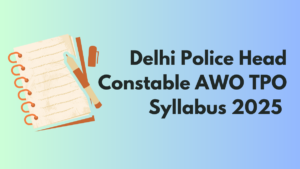UPSC Syllabus 2024: The Union Public Service Commission conducts the UPSC examination every year for shortlisting candidates for various Grade-A posts in the government sector. UPSC Civil Services Exam is one of the toughest and most reputed examinations in the country. Candidates interested in the forthcoming UPSC Recruitment must be aware of the UPSC Syllabus 2024.
Understanding the UPSC Syllabus helps an individual to plan and strategize their preparation journey in a way that maximizes their chance of success in the examination. Read below to check the detailed UPSC Syllabus and exam pattern for both prelims and mains examination.
UPSC Syllabus 2024: Overview
Union Public Service Commission released the official notification on 14th February 2024 for 1056 vacancies. Before studying it is important to check the syllabus which can help you to prepare for the UPSC 2024. The table provided below shows brief information related to the UPSC 2023, which is important for every aspirant.
| UPSC Notification 2024 | |
| Organization | Union Public Service Commission (UPSC) |
| Exam Name | UPSC Civil Service Exam 2024 |
| Exam Level | National |
| UPSC Notification 2024 Release Date | 14th February 2024 (Out) |
| UPSC Notification 2024 Apply Online Last Date | 5th March 2024 |
| UPSC Prelims Exam 2024 | 16th June 2024 |
| Vacancies (CSE and IFS) | 1056 |
| Category | Syllabus |
| Application Mode | Online |
| Exam Mode | Offline |
| Exam Stages |
|
| Education Qualification | Graduates or relevant degree |
| Age Limit | 21 years to 32 years (excluding reserved categories) |
| UPSC Official Website | upsc.gov.in |
UPSC Selection Process 2024
The Union Public Service Commission offers a wide range of vacancies across various departments of the government of India. To sill these vacancies, it follows a selection process that ensures the quality of candidates being selected for each of these posts. The deserving candidates will be appointed based on the following selection process.
- Preliminary Stage – General Studies & CSAT
- Mains Stage – 9 Theory Papers (GS I-IV, Language Papers, Essay & Optional)
- Personality Test – Interview
The explanation regarding the selection process is as follows:
| Prelims | Mains– | Interview– |
| It is qualifying in nature and tests the candidates on their general awareness and mental aptitude. It is conducted in 2 shifts on the same day. The first paper is of GS and the second is called CSAT. | It is a 5-day long exam with 9 papers, all subjective. It is a very lengthy and grueling part of the selection process. The marks scored by the candidates in this stage are the biggest factor in determining the merit list. | It is also known as the personality test is the most talked about portion of the selection process. It is the final stage of the selection journey and tests the candidates on multiple levels ranging from basic common sense to presence of mind. |
UPSC Exam 2024
The UPSC exam is one of the most elaborate recruitment processes in India and consists of prelims and mains written examinations before appearing for the interview stage. It is necessary for the candidates to be aware of the details of each stage of the recruitment process. The detailed UPSC prelims and mains Syllabus are tabulated below.
| UPSC Syllabus 2024 | ||
| Particulars | Prelims | Mains |
| No. of Papers | Two | Nine |
| Types of Questions | Objective Type | Descriptive Type |
| Duration of Exam | 2 hours each | 3 hours each |
| Total Marks | 400 | 1750 |
| Medium of Exam | English & Hindi | English & Hindi (except language paper) |
| Negative Marking | ⅓rd mark | No negative marking |
| Marks Counted in Merit | No | Yes |
UPSC Prelims Exam Pattern 2024
The detailed notification for the UPSC Recruitment 2024 provides the candidates with the exam pattern for each stage of the recruitment process out of which two will be offline written examinations and one will be a face-to-face interview. Check the UPSC Prelims Exam Pattern 2024 tabulated below. Candidates must check some of the important points to understand the exam pattern properly.
- 1/3rd mark of the total mark will be deducted for every incorrect answer.
- In General Studies (Paper I), each question is of 2 marks and there is a negative marking of 0.66 marks
- In CSAT (Paper-II), each question is of 2.5 marks and a negative marking of 0.833 marks for each wrong answer marked
- Paper II of the Civil Services (Preliminary) Examination will be a qualifying paper with minimum qualifying marks fixed at 33%.
| Paper | Subjects | Marks | No. of Questions | Duration |
|---|---|---|---|---|
| I | General Studies (GS) | 200 | 100 | 2 hours |
| II | Civil Services Aptitude Test (CSAT) | 200 | 80 | 2 hours |
UPSC Mains Exam Pattern 2024
The candidates qualifying for the UPSC prelims Exam will be eligible for the UPSC Mains Examination. The final result (merit list) will not include the prelims marks. There are 9 papers in the UPSC Mains Examination. Language papers are of qualifying marks and the rest will be scored. The Mains exam is conducted to test the candidate’s academic knowledge and ability to present the understanding according to the requirements of the question in a time-bound manner.
- Candidates need to score 25% in both qualifying papers i.e. 75 marks each.
- There are two qualifying papers in the mains exam, Namely “Paper A” and “Paper B” of 300 marks each.
- Two Qualifying Papers are “Any Indian Language from Eight Schedule “ and “English Language Paper”.
- All other seven papers are scoring in nature and their marks will be included in the final merit list.
- Candidates have to select any one subject from the table as their Optional subject for Paper VI and Paper VII.
| UPSC Mains Exam Pattern 2024 | ||
| Qualifying Papers | Marks | |
| Paper-A | One of the Indian Language to be selected by the candidate from the Languages included in the Eighth Schedule to the Constitution |
300 |
| Paper-B | English | 300 |
| Papers Counted for Merit | ||
| Paper-I | Essay | 250 |
| Paper-II | General Studies-I (Indian Heritage and Culture, History and Geography of the World and Society) | 250 |
| Paper-III | General Studies-II (Governance, Constitution, Polity, Social Justice, and International relations) | 250 |
| Paper-IV | Genera Studies-III (Technology, Economic Development, Bio-diversity, Environment, Security and Disaster Management) | 250 |
| Paper-V | General Studies-IV (Ethics, Integrity, and Aptitude) | 250 |
| Paper-VI | Optional Subject – Paper 1 | 250 |
| Paper-VII | Optional Subject – Paper 2 | 250 |
| Sub Total (Written Test) | 1750 | |
| Personality Test | 275 | |
| Grand Total | 2025 | |
UPSC Optional Subjects List for Mains Exam
The UPSC Mains Exam 2024 contains a total of nine papers out of which two are based on the optional subject they choose while filling out the application form. The details of these subjects are provided in the official notification for the reference of the candidates. The level of questions asked in this examination will be similar to the graduation syllabus of these subjects. Given in the table below is the list of the optional subjects our of which the candidates can pick one while filling out the application form.
| Optional Subjects List | |
|
|
UPSC Syllabus
Understanding the syllabus is the initial step for the candidates to focus on acquiring their desired dream job. Candidates must be preparing for UPSC, and this is the perfect time to revise your UPSC Syllabus 2024 and prepare accordingly. UPSC syllabus pattern for services such as the Indian Administrative Service, Indian Foreign Service, Indian Police Service, Indian Revenue Service, and other civil services is the same. Check more details here for UPSC Syllabus 2024.
The Union Public Service Commission conducts the UPSC CSE Exam in 2 stages i.e. Prelims and Mains. The first stage i.e. Prelims is qualifying in nature. The candidates have to score a minimum of 33% marks along with the marks above the cut-off as decided by UPSC. UPSC Prelims exam is conducted to shortlist the candidates for the Mains examination. The UPSC syllabus for the Prelims exam comprises two papers namely General Studies and CSAT (Civil Services Aptitude Test). Candidates can check the UPSC Exam Pattern 2024 and UPSC Syllabus 2024 here for detailed information.
UPSC Prelims Syllabus 2024
Check the detailed UPSC Prelims Syllabus 2024 for Paper 1 and Paper 2 below.
UPSC Prelims Syllabus for General Studies (Paper I)
- Current Affairs (Events) of national and international importance.
- History of India and Indian National Movement.
- Indian and World Geography-Physical, Social, and Economic Geography of India and the World.
- Indian Polity and Governance – Constitution, Political System, Panchayati Raj, Public Policy, Rights Issues, etc.
- Economic and Social Development – Sustainable Development, Poverty, Inclusion, Demographics, Social Sector Initiatives, etc.
- General issues on Environmental Ecology, Biodiversity, and Climate Change: that do not require subject specialization.
- General Science
UPSC Prelims Syllabus for CSAT (Paper II)
- Comprehension
- Interpersonal skills including communication skills
- Logical reasoning and analytical ability
- Decision-making and problem-solving
- General mental ability
- Basic numeracy (numbers and their relations, orders of magnitude, etc.) (Class X level), Data interpretation (charts, graphs, tables, data sufficiency, etc. – Class X level).
UPSC Mains Syllabus 2024
There are 9 papers in the UPSC Mains Examination. Candidates can check the subject-wise syllabus here.
UPSC Mains Syllabus For General Studies I
Indian Heritage and Culture, History and Geography of the World and Society:
- Indian culture covers the salient features of Literature, Art Forms, and Architecture from ancient to modern times.
- Modern Indian history includes significant events, personalities, and issues from the middle of the eighteenth century until the present.
- Various stages and important contributors and contributions from different parts of the country in ‘The Freedom Struggle’
- Post-independence consolidation and reorganization within the country
- History of the world includes events, forms, and effects on society from the 18th century like world wars, the Industrial Revolution, colonization, redrawing of national boundaries, decolonization, political philosophies like communism, capitalism, socialism, etc.
- Salient Aspects of Diversity of India and Indian Society
- Role of women and women’s organizations, population and associated issues, poverty and developmental issues, urbanization, their problems, and remedies
- Social empowerment, communalism, regionalism & secularism
- Distribution of key natural resources across the world including South Asia and the Indian sub-continent; factors responsible for the location of primary, secondary, and tertiary sector industries in various parts of the world including India
- Effects of globalization on Indian society
- Important Geophysical phenomena such as earthquakes, tsunamis, Volcanic activity, cyclones, etc., geographical features and their location- changes in critical geographical features (including water-bodies and ice-caps) and in flora and fauna and the effects of such changes.
- Salient features of the world’s physical geography.
UPSC Mains Syllabus For General Studies II
Governance, Constitution, Polity, Social Justice, and International Relations:
- Indian Constitution- historical underpinnings, evolution, features, amendments, significant provisions and basic structure
- Functions and responsibilities of the Union and the States, issues and challenges about the federal structure, devolution of powers and finances up to local levels, and challenges therein
- Comparison of the Indian constitutional scheme with that of other countries
- Separation of powers between various organs dispute redressal mechanisms and institutions
- Parliament and State Legislatures – structure, functioning, the conduct of business, powers & privileges, and issues arising out of these
- Appointment to various Constitutional posts, powers, functions, and responsibilities of various Constitutional Bodies
- Structure, organization, and functioning of the Executive and the Judiciary Ministries and Departments of the Government; pressure groups and formal/informal associations and their role in the Polity
- Salient features of the Representation of People’s Act
- Government policies and interventions for development in various sectors and issues arising out of their design and implementation
- Statutory, regulatory, and various quasi-judicial bodies
- Welfare schemes for vulnerable sections of the population by the Centre and States and the performance of these schemes; mechanisms, laws, institutions, and Bodies constituted for the protection and betterment of these vulnerable sections
- Development processes and the development industry the role of NGOs, SHGs, various groups and associations, donors, charities, institutional and other stakeholders
- Issues relating to the development and management of Social Sector/Services relating to Health, Education, Human Resources
- Important aspects of governance, transparency and accountability, e-governance- applications, models, successes, limitations, and potential; citizens charters, transparency & accountability, and institutional and other measures
- Issues relating to poverty and hunger
- 16. Role of civil services in a democracy
- Bilateral, regional, and global groupings and agreements involving India and/or affecting India’s interests
- India and its neighborhood– relations
- Important International institutions, agencies, and fora, their structure, mandate
- Effect of policies and politics of developed and developing countries on India’s interests, Indian diaspora
UPSC Mains Syllabus For General Studies III
Technology, Economic Development, Bio-diversity, Environment, Security, and Disaster Management:
- Indian Economy and issues relating to planning, mobilization of resources, growth, development, and employment.
- Development, Biodiversity, Environment, Security, and Disaster Management.
- Government Budgeting.
- Inclusive growth and issues arising from it.
- Major crop cropping patterns in various parts of the country, different types of irrigation and irrigation systems storage, transport, and marketing of agricultural produce and issues and related constraints; e-technology in the aid of farmers
- Economics of animal-rearing.
- Food processing and related industries in India- scope and significance, location, upstream and downstream requirements, supply chain management.
- Issues related to direct and indirect farm subsidies and minimum support prices; Public Distribution System objectives, functioning, limitations, revamping; issues of buffer stocks and food security; Technology missions
- Land reforms in India.
- Effects of liberalization on the economy, changes in industrial policy, and their effects on industrial growth.
- Infrastructure: Energy, Ports, Roads, Airports, Railways, etc.
- Investment models.
- Science and Technology- developments and their applications and effects in everyday life Achievements of Indians in science and technology;
- Indigenization of technology and developing new technology.
- Conservation, environmental pollution, and degradation, environmental impact assessment
- Awareness in the fields of IT, Space, Computers, robotics, nano-technology, bio-technology, and issues relating to intellectual property rights.
- Disaster and disaster management.
- Role of external state and non-state actors in creating challenges to internal security.
- Linkages between development and spread of extremism.
- Challenges to internal security through communication networks, the role of media and social networking sites in internal security challenges, basics of cyber security; money laundering and its prevention
- Various Security forces and agencies and their mandate
- Security challenges and their management in border areas; linkages of organized crime with terrorism
UPSC Mains Syllabus For General Studies IV
- Ethics and Human Interface- Essence, determinants, and consequences of Ethics in human actions; dimensions of ethics; ethics in private and public relationships
- Human Values- lessons from the lives and teachings of great leaders, reformers, and administrators; the role of family, society, and educational institutions in inculcating values
- Attitude- content, structure, function; its influence and relation with thought and behavior; moral and political attitudes; social influence and persuasion
- Aptitude and foundational values for Civil Service, integrity, impartiality and non-partisanship, objectivity, dedication to public service, empathy, tolerance, and compassion towards the weaker sections
- Emotional intelligence concepts, and their utilities and application in administration and governance
- Contributions of moral thinkers and philosophers from India and the world
- Public/Civil Service values and Ethics in Public administration- Status and problems; ethical concerns and dilemmas in government and private institutions; laws, rules, regulations, and conscience as sources of ethical guidance; accountability and ethical governance; strengthening of ethical and moral values in governance; ethical issues in international relations and funding; corporate governance.
- Probity in Governance- Concept of public service; Philosophical basis of governance and probity; Information; sharing and transparency in government, Right to Information, Codes of Ethics, Codes of Conduct, Citizen’s Charters, Work culture, Quality of service delivery, Utilization of public funds, challenges of corruption
- Case Studies on the above issues.
UPSC IAS Interview Test
The candidates qualifying for the preliminary and mains will be eligible for the UPSC IAS Interview Test. Candidates must check the important points mentioned below.
- The candidate will be interviewed by a board who will have before them a record of his/her career and interests filled by him/her in the Detailed Application Form (DAF).
- The objective of the interview is to check the personal suitability of the candidate for a career in civil services by a board of competent and unbiased observers.
- In the personality test, apart from their academic study, candidates must be aware of the affairs happening both within and outside their state or country.
- The interview is more of a purposive conversation intended to explore the mental qualities and analytical ability of the candidate.
- The Interview test will be 275 marks and the total mark for the written examination is 1750. This sums up to a Grand Total of 2025 Marks based on which the final merit list will be prepared.
UPSC Syllabus 2024 PDF
For the candidates preparing to appear for the UPSC Examination in the upcoming year, we have provided a PDF below that compiles the detailed syllabus for both stages of the examination.



 DSSSB MTS Syllabus 2026, Exam Pattern an...
DSSSB MTS Syllabus 2026, Exam Pattern an...
 Delhi Police Constable Syllabus 2025 and...
Delhi Police Constable Syllabus 2025 and...
 Delhi Police Head Constable AWO TPO Syll...
Delhi Police Head Constable AWO TPO Syll...










